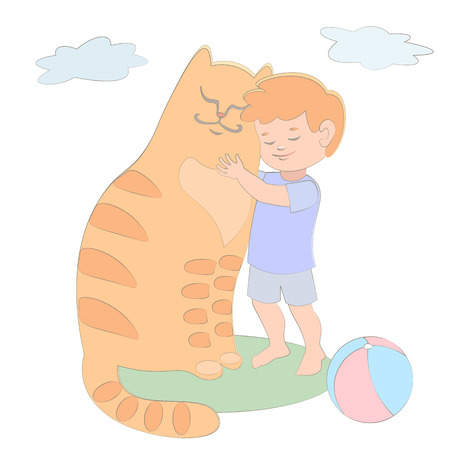Introduction: Caring for Injured Pets in Indian Homes
In many Indian households, dogs and cats are cherished family members, bringing joy and companionship to daily life. However, just like humans, our furry friends can sometimes get injured at home or outdoors. Understanding basic first aid for pets is crucial for every pet parent in India, as timely intervention can prevent complications and save lives. Common causes of injuries among dogs and cats here include road accidents, bites from other animals, falls from heights, burns from kitchen accidents, or even wounds caused by sharp objects around the house. With Indias unique environment—ranging from busy urban streets to rural landscapes—pets often face different risks compared to those in Western countries. This makes it important for Indian pet owners to be well-prepared to handle emergencies until professional veterinary help is available. In this article, we will guide you through practical steps to treat minor injuries at home and explain when its necessary to take your pet to a vet in India.
Basic First Aid Steps for Dog & Cat Injuries
When your beloved dog or cat is hurt, staying calm and acting quickly is crucial. In many Indian homes, you can find common items to help manage minor injuries before reaching a veterinarian. Here are essential first aid steps every Indian pet parent should know:
Stay Calm and Ensure Safety
If your pet is injured, approach them slowly and gently. Speak softly in familiar languages—like Hindi, Tamil, or Telugu—to comfort them. Use a cloth or dupatta to gently muzzle dogs if they might bite out of pain. Ensure there are no dangers around (such as open flames from diyas or stoves).
Essential Household Items for First Aid
| Item | Use | How to Apply |
|---|---|---|
| Clean Cotton Cloth (Gamcha) | Stop bleeding, cover wounds | Apply gentle pressure on the wound to control bleeding |
| Sterile Gauze/Bandage (from home first-aid kit) | Cover cuts/scratches | Place over wound after cleaning; wrap without being too tight |
| Coconut Oil or Turmeric Paste | Mild antiseptic for small cuts (for minor wounds only) | Dab lightly on cleaned wound (avoid deep cuts or bites) |
| Syringe (without needle) or Clean Spoon | Rinse wounds | Flush wound with clean, boiled, cooled water to remove dirt |
| Ice Pack (wrapped in towel) | Reduce swelling or bruising | Apply gently for 5-10 minutes at a time |
| Tweezers (sanitised with Dettol/Spirit) | Remove visible thorns/glass pieces | Gently pull out foreign objects if easily accessible |
Step-by-Step First Aid Process
- Restrain your pet safely: For cats, use a towel to wrap gently; for dogs, use a leash or soft cloth.
- Assess the injury: Check the type and severity—minor scratch, deep wound, bleeding, burn, etc.
- Stop bleeding: Press a clean cotton cloth firmly on the area until bleeding slows down.
- Clean the wound: Rinse with cooled boiled water using a syringe or spoon. Avoid using strong antiseptics like iodine directly unless advised by a vet.
- Apply dressing: Cover with gauze or bandage if necessary. For small wounds, you may apply a light layer of coconut oil or turmeric paste after cleaning.
- Monitor your pet: Keep your pet calm and restrict their movement until you consult your local vet.
Cultural Note:
Avoid using traditional remedies like haldi milk on open wounds, as some substances may not be safe for pets. Always prefer simple cleaning and covering until professional help is available.

3. Common Injuries in Indian Context & Home Remedies
India’s unique environment presents several risks for dogs and cats, including busy streets, extreme weather, and frequent encounters with stray animals. Understanding the most common injuries and appropriate first aid is essential for every Indian pet owner.
Road Accidents
With India’s crowded roads, pets often get injured by vehicles. If your dog or cat is hit by a vehicle:
- Move them to a safe area using a cloth or blanket as a stretcher to avoid further injury.
- Check for bleeding; apply gentle pressure with a clean cloth to stop minor bleeding.
- Avoid giving water or food if the animal is unconscious or has serious injuries.
When to Visit the Vet
If there are visible fractures, continuous bleeding, unconsciousness, or difficulty breathing, rush your pet to the nearest veterinary clinic immediately.
Bites from Other Animals
Bite wounds are common due to encounters with street dogs or cats. Clean the wound gently with saline water or diluted Betadine solution. Avoid applying turmeric directly on open wounds as it may cause irritation. Keep the pet calm and prevent licking of the wound.
Precaution
Bite wounds can easily get infected in India’s warm climate. Watch for swelling, pus, or fever. Always consult your vet if the bite is deep or from an unknown animal, especially due to rabies risk.
Heatstroke
The hot Indian summers put pets at high risk of heatstroke. Symptoms include excessive panting, drooling, weakness, and even collapse.
- Move your pet to a cool shade immediately.
- Wet their body with cool (not ice-cold) water and fan them gently.
- Offer small amounts of water but do not force feed.
Precaution
Avoid walking pets during peak afternoon hours. Never leave them in parked vehicles. If symptoms persist beyond 10 minutes or if your pet collapses, seek veterinary help urgently.
Note on Traditional Remedies
While Indian households often use neem leaves, turmeric, and coconut oil for minor issues like itching or small cuts, always ensure these are safe for your pet’s species and consult a veterinarian for anything more serious. Each home remedy should be used with caution considering possible allergies or sensitivities in individual pets.
4. What You Should Never Do: Traditional Myths vs. Veterinary Advice
In India, pet care is often influenced by traditional remedies and age-old myths passed down through generations. While these home remedies are shared with good intentions, some can actually worsen your dog or cat’s injury. Understanding what not to do is as crucial as knowing how to help your pet. Here we highlight some common misconceptions and provide accurate veterinary advice for each.
Common Indian Myths vs. Medical Facts
| Traditional Belief/Myth | Veterinary Guidance |
|---|---|
| Applying turmeric (haldi) directly on wounds | Turmeric has natural antibacterial properties but using raw powder can introduce contaminants and delay healing. Use only vet-approved antiseptics for wounds. |
| Using mustard oil or coconut oil on injuries | These oils can trap bacteria and dirt, leading to infections. Clean with saline solution or prescribed antiseptic washes instead. |
| Tying cloth tightly around wounds to stop bleeding | This may restrict blood flow and cause tissue damage. Apply gentle pressure with a clean gauze pad until professional help is available. |
| Giving human painkillers like paracetamol or ibuprofen | Many human medicines are toxic to pets. Never medicate your pet without consulting a vet. |
Why These Myths Persist in Indian Households
Many Indian families have long relied on household items for first aid due to limited access to veterinary services, especially in rural areas. While some ingredients like turmeric have healing properties, their direct use without proper knowledge can be harmful to pets.
Veterinary-Approved First Aid Steps:
- Always clean wounds gently with saline water or a vet-approved antiseptic.
- Avoid applying any powders, oils, or spices to open wounds.
- If bleeding doesn’t stop, apply pressure and seek veterinary care immediately.
If you are unsure about any remedy, it is always best to consult your local veterinarian rather than relying on traditional practices that may do more harm than good. Your furry friend deserves the safest and most effective care!
5. When to Seek Immediate Veterinary Attention
While minor injuries in dogs and cats can often be managed at home, it is crucial to recognise when professional veterinary care is necessary—especially in India, where access to vets may vary between urban and rural locations. Timely intervention can be life-saving for your pet.
Clear Signs That Require Urgent Vet Care
- Severe bleeding: If the wound does not stop bleeding within 10 minutes even after applying pressure, seek a vet immediately.
- Difficulty breathing: Rapid, shallow or laboured breathing, or any signs of choking, are emergencies that need instant attention.
- Unconsciousness or seizures: If your pet collapses, becomes unresponsive, or has convulsions, rush to the nearest veterinary hospital.
- Deep wounds or exposed bones: Deep cuts or visible bone from fractures need professional cleaning and treatment to avoid infection or further damage.
- Persistent vomiting or diarrhoea: Especially if accompanied by blood, lethargy, or dehydration (sunken eyes, dry gums).
- Inability to stand or walk: Sudden paralysis or weakness could indicate spinal injuries or poisoning.
- Severe pain: Continuous whining, yelping, restlessness, or aggression when touched may mean severe internal injuries.
Considerations for Indian Pet Owners
In Indian Cities
Larger cities like Mumbai, Delhi, Bengaluru, and Chennai usually have 24/7 veterinary clinics and animal hospitals. Save the contact details of emergency vets on your phone for quick access. Many urban areas also offer home visits for critical situations—consider registering with a local service in advance.
In Rural Areas
If you live in a village or a remote area where vet clinics are few and far between, keep a basic first aid kit ready and know the fastest route to the nearest government veterinary dispensary. In case of severe emergencies, you might need to arrange transport quickly—auto-rickshaws or even tractors are sometimes used to reach help. Community WhatsApp groups can be helpful for sharing resources and getting referrals to mobile vets who serve rural regions.
Your Quick-Action Checklist
- Do not wait if you notice any of the above symptoms—delays can worsen your pet’s condition.
- If possible, call ahead to the vet so they can prepare for your arrival.
- Carry your pet’s medical records with you if available; this helps the vet provide faster treatment.
Recognising these warning signs and knowing how to act swiftly ensures your furry friend receives the best chance of recovery—no matter where you live in India.
6. Finding and Reaching a Vet in India
In India, timely veterinary care is crucial when home treatment isn’t enough for your dog or cat. Knowing how to quickly find a vet can make all the difference, especially during emergencies. Here are practical tips tailored to both metro cities and small towns.
Tips for Finding Nearby Vets
Metro Cities: Cities like Mumbai, Delhi, Bengaluru, and Chennai have a wider network of veterinary clinics. Use Google Maps or local apps like Practo and Justdial to search for “veterinary clinic near me.” Many clinics also have their own websites with updated contact details.
Small Towns: In smaller towns, ask local pet shop owners, animal shelters, or fellow pet parents for recommendations. Community WhatsApp groups can be valuable sources of information on trusted local vets.
Emergency Numbers You Should Know
Keep a list of important contacts handy:
- The phone number and address of your regular vet
- Emergency 24×7 animal hospitals (available mostly in metros)
- Local municipal corporation’s animal helpline (each city/town may have different numbers)
- Animal welfare NGOs like Blue Cross of India or People For Animals often provide emergency help
Mobile Vet Services: A Growing Trend
Especially in metro cities, mobile veterinary services are becoming popular. These services offer doorstep checkups and minor treatments—ideal if you cannot transport your pet easily. Search online for “mobile vet service” along with your city name, or check pet care platforms for listings.
Key Takeaway
No matter where you live in India, it is essential to prepare ahead by saving key contacts and knowing the nearest available vet. This helps ensure your dog or cat receives quick medical attention when home remedies aren’t enough.
7. Preventive Measures: Keeping Your Pets Safe
Prevention is always better than cure, especially when it comes to your beloved dogs and cats. In India, our neighbourhoods, festive seasons, and diverse weather patterns can expose pets to unique risks. Here are some practical tips to help you protect your furry friends from common injuries:
Identify Common Hazards in Indian Homes & Streets
Indian households often have open balconies, terraces, and stairs that can pose fall risks for pets. Ensure these areas are secured with grills or barriers. On streets, watch out for speeding vehicles, stray animals, sharp objects like broken glass, and open drains during walks.
Be Mindful During Festivals
Festivals such as Diwali and Holi bring joy but can also be hazardous for pets. Firecrackers can cause burns and noise-induced anxiety, while colours used during Holi may contain harmful chemicals. Keep pets indoors during festivities, avoid exposing them to loud sounds, and never apply colours on their fur.
Weather-Related Precautions
The extreme heat of Indian summers can lead to heatstroke, dehydration, or burnt paws from hot pavements. Always walk your pets early morning or late evening and provide ample drinking water. During monsoons, keep pets dry to prevent skin infections and check their paws for leeches or fungal growth.
Safe Play and Exercise
Encourage playtime in enclosed spaces. Use leashes when outdoors to prevent unexpected escapes or fights with other animals. Remove small objects or toxic plants from the garden that could be swallowed by curious pets.
Vaccination and Parasite Control
Regular vaccinations and deworming protect against rabies and common parasites found in Indian environments. Consult your local vet for the right schedule based on local health risks.
Community Awareness
Educate neighbours and family members about pet safety practices. Work together to maintain a clean environment free of hazardous waste, ensuring all community pets stay healthy and safe.
By staying alert to these common hazards and taking simple preventive steps, you can greatly reduce the risk of injuries for your dogs and cats at home in India.

